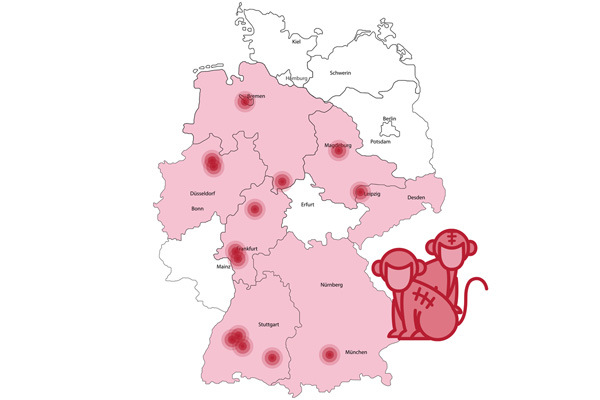New investigation reveals the extent of primate experiments in Germany
- Press release
On world animal day, Doctors Against Animal Experiments calls for immediate stop
For the first time, the nationwide organisation Doctors Against Animal Experiments (DAAE) has documented in a new analysis which institutions in Germany use primates for experiments. Fourteen institutions across eight federal states were identified, where between 1,700 and 3,500 animals are forced to suffer annually. Some primates spend many years or even decades in laboratories. On World Animal Day, October 4, DAAE is calling for an immediate stop to all experiments on our closest relatives and urges the public to support the ongoing Bundestag petition (petition to the German parliament), which runs until October 20.
The investigation by DAAE names, for the first time, the 14 institutions conducting primate experiments in Germany. In Baden-Württemberg, there are four laboratories, three of them in Tübingen, where the notorious primate brain research is conducted. The fourth facility is the pharmaceutical company Boehringer Ingelheim. In Hesse, three laboratories are involved: at the Ernst Strüngmann Institute in Frankfurt and the University of Marburg, primates are used for neurological research and are sometimes kept in laboratories for decades. Additionally, the Paul Ehrlich Institute in Langen uses primates.
The sad leader in terms of the number of primates is North Rhine-Westphalia. Here, the company Labcorp in Münster annually uses well over a thousand long-tailed macaques (Javanese monkeys) and numerous marmosets for regulatory testing. Among other things, potentially toxic substances are tested on pregnant females. Labcorp is thus the largest primate laboratory in Germany.
Additional primate laboratories exist in Bavaria, Bremen, Lower Saxony, Saxony, and Saxony-Anhalt. The most frequently affected species are the endangered long-tailed macaques. Other species used include rhesus monkeys, marmosets, capuchins, green monkeys, and baboons.
The investigation also reveals severe lack of transparency in primate experiments. Many animals are used over years in so-called “continuous experiments” and therefore do not appear in official statistics. This is the case in Bremen, where primate brain research has been conducted for decades. Very little public information exists about the species, procedures, and purposes of many experiments. DAAE therefore provides examples from scientific journals to illustrate what is done to the animals in these laboratories.
Dr. Corina Gericke, veterinarian and vice chair of DAAE, says: “Our analysis shows the extent of suffering endured by primates in German laboratories. It is shocking that our closest relatives are often subjected to experiments for decades. Moreover, the results provide no benefit to humans. We demand an immediate end to all primate experiments and advocate for the abolition of all animal testing.”
Instead, DAAE advocates for human-based research, including the use of human cell cultures, mini-organs, and multi-organ-chips in combination with enhanced disease prevention. DAAE emphasizes that modern and ethically responsible research can only be achieved through such methods.
On World Animal Day, October 4, the organisation points to the current Bundestag petition initiated by DAAE and PETA. If at least 30,000 signatures are collected by October 20, the German Bundestag must address the petition’s demands. Dr. Gericke appeals: “Your signature counts. Please support the petition!”

Primate experiments are conducted at 14 institutions across 8 federal states in Germany.
Free to use, reference: Doctors Against Animal Experiments e.V.
